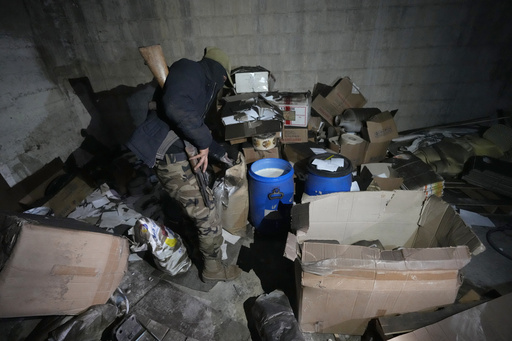
BEIRUT — Following the downfall of former Syrian President Bashar Assad, extensive production facilities for the amphetamine-like stimulant Captagon have been discovered throughout the country, contributing to a staggering $10 billion annual global market for this highly addictive substance.
Among the various sites utilized for manufacturing Captagon were the Mazzeh air base in Damascus, a car dealership in Latakia, and a former snack chip factory in Douma, which government forces seized in 2018.
Firas al-Toot, the original owner of the Douma factory, recounted how he returned to find it ablaze. “They came at night and lit the drugs on fire but couldn’t burn everything,” he said. Captagon’s distribution, according to Abu Zihab, an activist from Hayat Tahrir al-Sham, which currently governs the region, was aimed at inflicting harm on the local population.
The conflict, which has ravaged Syria for nearly 14 years, has fragmented society and devastated the economy, creating optimal conditions for the drug’s proliferation. Militant groups and the Assad government transformed the production of Captagon from minor illicit operations into a multi-billion dollar industry that has financed their sustained power.
The recent political shifts in Syria have disrupted these longstanding drug networks, presenting a unique opportunity to dismantle Captagon’s manufacturing infrastructure, according to experts.
Captagon was initially synthesized in Germany in the 1960s as a treatment for conditions such as narcolepsy but was later banned due to its potential for addiction and cardiovascular issues. Its stimulating effects have rendered it popular across the Middle East, especially among fighters and the elite, who favor its ability to enhance concentration and alleviate weariness.
Amid Syria’s economic crisis and international sanctions, Assad’s regime recognized the potential in the now-cheaply produced narcotic. Captagon is generated through straightforward chemical processes, typically in makeshift labs where amphetamine derivatives are combined with other substances to create tablets.
The industrialization of Captagon production began around 2018-2019 as various factions, including the Assad regime, started investing in manufacturing facilities and smuggling networks, thus positioning Syria as the world’s leading producer of Captagon, with additional contributions from Lebanon.
Data from the New Lines Captagon Trade Project indicates that the majority of Captagon confiscated globally originates from Syria. A report from May outlined the compelling evidence linking Assad’s regime to the Captagon operations, noting that the Security Office of the 4th Armored Division, led by Bashar al-Assad’s brother Maher, was instrumental in establishing a coordinated production system.
Captagon was illicitly transported across borders inside trucks and freight shipments, often cleverly hidden among food items, electronics, and building materials to avoid law enforcement. The primary smuggling routes traversed Syria’s porous borders with Lebanon, Jordan, and Iraq, facilitating distribution to affluent markets such as Saudi Arabia and the UAE.
The Captagon trade has seen significant growth in Lebanon, particularly near the border and in the Bekaa Valley. Lebanese authorities have struggled to combat this influx, primarily due to Hezbollah’s involvement in the smuggling operations. After the discovery of drugs concealed within crates of fruit, Saudi Arabia and the UAE imposed bans on agricultural imports from Lebanon.
The Captagon trade has extended its reach to regions as distant as Southeast Asia and parts of Europe.
The estimated annual global market for Captagon stands at around $10 billion, with profits to the Assad family approximating $2.4 billion each year. Caroline Rose, director of the New Lines Institute Captagon Trade Project, expressed her astonishment at the scale of industrial facilities linked to the regime, stating, “There was extensive evidence linking key regime-aligned cronies and Assad family members to the trade.”
The precise number of Captagon production sites in Syria remains uncertain, but estimates suggest that there are hundreds scattered across the country.
Despite persistent attempts from neighboring countries to limit drug trafficking, they have had little influence over Assad’s government. Saudi Arabia has instituted severe penalties against trafficking and tightened border security, partnering with other Gulf nations to monitor smuggling routes. However, these initiatives face hurdles due to the intricate networks operating across Syria, Lebanon, and Jordan.
Captagon has been leveraged by Assad’s government to assert influence in diplomatic discussions regarding his political isolation. In recent years, as several Arab nations have resumed relations with him, addressing the Captagon trade has become a crucial point in negotiations aimed at restoring ties. Following Syria’s readmission to the Arab League in May 2023, the country pledged to reign in the smuggling trade, resulting in the establishment of a regional security cooperation committee.
Recent actions, such as Jordan ramping up surveillance along its border with Syria, appear to coincide with shifts in discussions surrounding Captagon, particularly following airstrikes targeting well-known drug traffickers likely conducted with Assad’s approval.
HTS leader Ahmad al-Sharaa proclaimed that Assad transformed Syria into “the largest Captagon factory in the world.”
While the regime has historically profited from Captagon, reports indicate that various Syrian opposition factions have also engaged in drug production and trafficking. Analysts predict that while a temporary reduction in supply may occur as industrial production decreases, criminal organizations are known for their adaptability and may explore new avenues for production and smuggling efforts, especially with demand remaining steady.
Establishing programs for economic development within Syria will be essential for steering citizens away from illicit economic activities, as emphasized by Rose, while also addressing the need to dismantle the Captagon trade.

